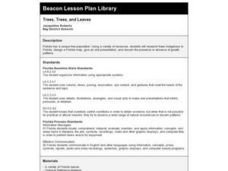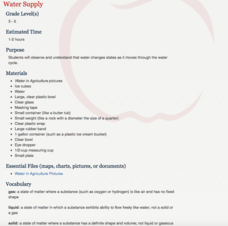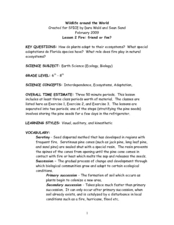Curated OER
Trees, Trees, and Leaves
High schoolers research and examine trees indigenous to Florida. They develop a table/chart, draw leaves, design a map of Florida, and prepare and give oral presentations discussing the presence or absence of tree growth patterns.
Curated OER
National Marine Sanctuaries Fish
Information is provided on Gray's Reef, Florida Keys, and Flower Garden Banks marine sanctuaries. Young marine biologists then visit the FishBase and REEF databases to collect fish species information for each location. They then...
Curated OER
Salmon Vs. Dams: the Dam Removal Debate on the Elwha River
Learners role-play a meeting of the Elwha River council in which they present opposing views to council members on hydroelectric power and salmon fisheries resources. They brainstorm possible conflicts between various people in land-use...
Southwest Florida Water Management District
WaterWeb - Conservation and Water Supply
If 71% of our planet is covered with water, why do we need to bother conserving water? Find out with these activities designed for middle and high school environmental scientists. From reading articles to solving crossword puzzles, to...
Curated OER
Nine Lives, One Habitat
Students explore reintroduction of endangered species into new habitats. They research and promote possible sites for reintroducing populations of Florida panthers outside of their current habitat in the Big Cypress Swamp region of...
Curated OER
Non Native Species: English Ivy-Landscape Plant or Deadly Killer?
Students study the impact that invasive species have on biodiversity and more natural areas.
Curated OER
Diverse Environments
Students explore life forms in different environments. After exploring different biomes within their state, students research different plant and animal species within each biome. They prepare a group report on one feature of the region...
Curated OER
Oh Deer!
Learners discuss the components necessary to keep animal populations alive . Then they participate in a game where they interact as deer, food, water, and shelter. The activity demonstrates that nature is not static, but changes with the...
Orange County Water Atlas
Location, Location, Location…
Young geographers discover not only how to read and recognize coordinates on a map, but also gain a deeper understanding of latitude and longitude and how climate changes can vary significantly across latitudes.
National Institute of Food and Agriculture
Water Pollution Demonstration
Water pollution is everywhere, and pollutants range from oil to fertilizers. Bring the concept to life by demonstrating the difficulties in getting particular pollutants out of water.
National Institute of Food and Agriculture
Water Supply
Participate in three activities that look at the earth's limited water supply and the changes water goes through as it enters each phase of the water cycle. The resource is complete with three activities that demonstrate the changing...
Agriculture in the Classroom
Design 'Y'er Genes
How do changes in DNA affect an organism? Scholars explore chromosomes, genes, DNA, and mutations by modeling the DNA of a strawberry. They build a DNA model, then manipulate it to show how changing the genes transforms the strawberry...
Curated OER
Bermuda Triangle
Young scholars explore what the Bermuda triangle is and the theories as to why it is so mysterious. In this mystery lesson students read and discuss the history and the mystery behind the Bermuda Triangle.
Curated OER
Ecotourism in National Parks and Wilderness
Young scholars develop a plan for ecotourism after researching a nearby national park or wild area.
Curated OER
Wildlife Around the World
Students examine how plants are able to adapt to their ecosystem and the role that fire plays in changes through the years. In this ecosystem lesson plan students complete several exercises focussing on plants and their adaptations...
Curated OER
Latex Helium Balloons: Any Alternatives?
Students discuss the latex balloon release controversy and review suggested alternatives to the latex balloon.
University of Florida
Florida Museum of Natural History: About the Florida Everglades
Everything you always wanted to know about the Everglades! The Florida Museum of Natural History offers great photos and good information on the many habitat types to be found there.
University of Florida
South Florida Aquatic Environments: Florida Keys: About the Keys
The Florida Museum of Natural History offers an excellent review of the reefs, mangrove and seagrass habitats of the Florida Keys. Spend some time learning about this unique location.
Florida State University
Florida State University: Molecular Expressions: Electromagnetic Radiation
This Florida State University page introduces light as an electromagnetic wave and discusses the frequency and wavelength range of the various regions of the electromagnetic spectrum. Includes links to some interactive Java applets.
University of Florida
Florida Museum of Natural History: About the Florida Bay
Explore the habitats found where the Everglades run into the sea. A wonderful resource for learning about a unique part of the world.
Ed Koday
Web Archive: Luna Moths
Luna moths are one of the most unusual and beautiful of the North American moths known as Saturnidae. They are well known for their green-yellow colors and long tails,and although they are often seen in pictures, they are a real surprise...




















